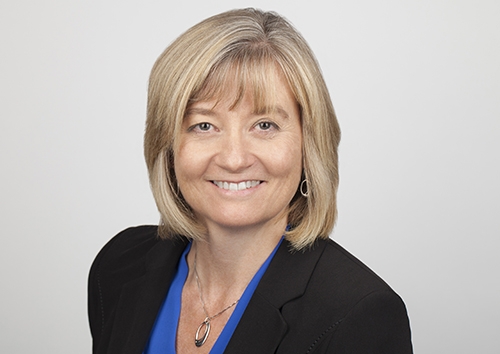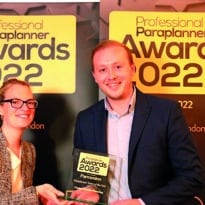Rising to the challenge
For this issue’s paraplanner profile we talk to Helen Parker, winner of the PFS Paraplanner of the Year award 2015, about her role as senior paraplanner and paraplanning as a profession
Helen Parker, senior paraplanner with Midlands-based Clay Rogers & Partners Ltd, has over 25 years experience of working in the financial services industry. She has a few qualifications under her belt as well; she is a Chartered Financial Planner, a Certified Financial Planner, a fellow of the Institute of Financial Planning and a fellow by examination of the Personal Finance Society. She is also CF30 authorised, which means she is able to offer advice to clients and recently she took responsibility for a couple of clients of her own for the firm. However, she says she does not envisage becoming a full-time financial planner, preferring “the technical nature of paraplanning” to the client relationship building role of the financial planner.
As might be surmised from her list of qualifications, Helen says she constantly seeks out challenges and top of her list is finding ways to promote and demonstrate the professionalism that exists within the financial planning industry. Helen says: “This is an industry based on relationships between people and as well as always looking at how we can improve the overall service and experience of the end client, it’s an industry where we can lead by example.”
Helen set her sights on attaining the PFS or the IFP paraplanner of the year awards back in 2012 and she has been runner up in awards for both professional bodies. This year was her year and at the recent awards ceremony she was announced as the PFS Paraplanner of the Year 2015.
Despite the awards process being pretty grueling, “especially the case study” Helen says she would recommend that other paraplanners enter the various industry awards, those where their skills as paraplanners are properly assessed. “It’s a good way to test your research and writing skills and it challenges you to think beyond your day-to-day role. It’s also a way that we can demonstrate and celebrate the high level of professional achievement that exists in paraplanning and within the industry,” she says.
Asked about the professional bodies, Helen says she believes both organisations have role to play in the industry. “I look to the PFS/CII for my technical skills and to the IFP for its focus on holistic financial planning. Going through the process to achieve Certified Financial Planner status from the IFP was a light bulb moment for me when I saw how I could put everything I’d learned into practice. But you need the technical knowledge and up until now the PFS/CII has been the only way to get it,” she says. She adds that she would recommend that people look to both qualification paths “as they will give you a balance in the work that you do”.
Senior paraplanner
Helen started her career in financial services in general insurance broking but moved into the financial advice arm of a broker in 1990. One of her first roles was preparing investment portfolio valuations by manually going through the unit prices in the Financial Times and entering them into a computer. This role grew as Helen took on increasing amounts of administrative work and developed into one of office manager. “But really, much of what I was doing was what now we would call paraplanning duties,” she says.
Her first full-time paraplanning role, under the title of financial planning technician, was in January 2006 for a company that later became Provest Wealth Management and she joined Clay Rogers & Partners as senior paraplanner in 2008.
Helen heads up the paraplanning team at the firm, which has 29 employees in total, including eight registered individuals and five paraplanners, with Helen included in both camps. Each adviser works with a specific paraplanner and one to two administrators. Helen works directly for the managing director, Mark Rogers, as his dedicated paraplanner. “As paraplanners we are the link between the adviser and the administrators, as well as putting together the financial plans for clients,” she says. Helen attends a large number of client meetings and will discuss with the planner what the client’s objectives are before putting the financial plan together. “Also, I’m often the client’s first point of contact as I’m usually in the office more than Mark is,” she says.
Helen says meeting with clients has given her both insight and experience which she feels have been “absolutely crucial” to her role. “When you meet clients in person you really do get to know them as people and you can better understand what they want to do and why we, as financial planners and paraplanners, are working towards generating retirement income for them or whatever it is they want to achieve.”
Helen believes the vertical team approach, where the paraplanner works closely with the one financial planner and a set of administrators, works well for the practice. “Every planner is different as a person and I think it helps when they are dealing just with you as you get used to the way that they work and that can make the process much more efficient than, for example, having a pooled paraplanning team where you don’t get that same level of relationship with the planner and their clients,” she says.
Helen also instigates paraplanner meetings “to share best practice, discuss any issues and problems we may have and to see where we can improve on what we do,” she says. “For example, we’re currently reviewing the templates and report documents that we use to ensure better commonality across the business, so that clients get the same experience no matter which of the advisers is handling the advice.”
The firm also recently implemented new procedures to follow the six steps of financial planning and Helen was part of the focus group that drove the project forward. “I gave the group a sense check from both a paraplanner and an administrative point of view,” she explains.
Paraplanning roles within the firm differ, such as in respect of the paraplanner’s involvement in client meetings and developing the financial plans, and that is down to the way that individual financial planner works, Helen says.
While Helen is qualified and authorised to give advice, moving towards being a financial planner is not a route she feels she will take, as her current role suits her skills set and what she wants out of the job. “In the main, I get involved with clients because Mark is out of the office a lot and I have the knowledge and experience to have conversations and to write to our clients about recommendations. It allows me the flexibility to talk to people when it’s needed.
“It’s great role for me because Mark has allowed me to have a lot of client contact but without having client relationship as the main focus of my role. I’m still focused on the technical areas and the number crunching which, even after all this time, is the part of the role that interests me.”
Involvement in the client meetings has also given her increased job satisfaction. “What’s been great is to see clients that I first met six or seven years ago actually achieve what they set out to achieve with their financial planning. Having the contact with the client means you fully appreciate what’s been done for them and I don’t think you’d really get that from reading a file note from an adviser.”
Paraplanning as a profession
Helen believes that the future for paraplanning is “bright and very positive”.
“There’s a lot of interest and promotion of paraplanning at the moment which I think is fantastic. Paraplanners are playing an ever more important role in the industry, both in supporting advisers and providing that liaison between advisers and administration.
“From a compliance perspective, it’s another pair of eyes on the recommendation. There are some people who say they can’t see the value in having a paraplanner but I think the industry is going to find that paraplanners are increasingly valuable to adviser practices. On the other hand, we have to remember that without advisers there would be no need for paraplanners, so we have to make sure we are working with advisers and not against them.
“We may not always agree with the planner and I think it’s healthy for the industry for paraplanners to feel strong and confident enough to have those debates with the adviser they are working with, but we need to remember we’re part of a team.”
In that respect, she says, if a paraplanner is going to challenge their planner then they should always make sure that they’re certain of their facts. “And think things through logically.”
It’s also important, she adds, that if paraplanners want to broaden their knowledge and experience that they should be prepared to listen to people, “whether that is their planners, administrators, other paraplanners or people outside of our industry. Be willing to learn,” she says.
In respect of her own future, while staying a paraplanner Helen says she is always looking for challenges. I don’t want to move away from being a paraplanner. It’s what I want to do, although I am lucky that I have the option to do some planning as well.
“I can honestly say that I enjoy the job and when you’re working five full days a week you need to be able to enjoy it. You get to meet some really great people whether clients, our paraplanning peers, planners or the providers that we meet.”
As part of her role, Helen says, she has also developed an interest in football. “I make sure I keep up-to-date with all the football scores as it’s surprising how much that comes up as a topic of conversation with clients and you do need to be able to have conversations with clients on all levels.” For the record, Helen is a Baggies supporter – that’s West Bromwich Albion FC to the uninitiated.
A typical week for Helen
A typical week for Helen, she says, will include meeting one or two clients alongside her financial planner, and she will prepare two to three financial plans, alongside suitability report writing and cashflow forecasting. The latter is undertaken for the top clients in the firm, typically those with investible assets of £500k-£600k and above, “where people have more complicated financial plans and they need that level of analysis,” Helen says. The firm subscribes to Prestwood’s Truth software.
Also, she will monitor the investment solutions utilised by the firm in its centralised investment proposition, “to provide an overview how they are performing”. This she feeds back to her financial planner “and if there are any issues that I think should be raised I’ll refer them to the other teams in the firm as well,” she says.
Most of the firm’s clients have a core investment strategy consisting of a portfolio of asset allocated passive investments, strategically mapped against Finametrica with a tactical overlay to take advantage of any short-term investment opportunities.
In addition, she says, “I’ll keep up-to-date with what’s happening in the investment markets, as well as the economy and the wider world too.”





























